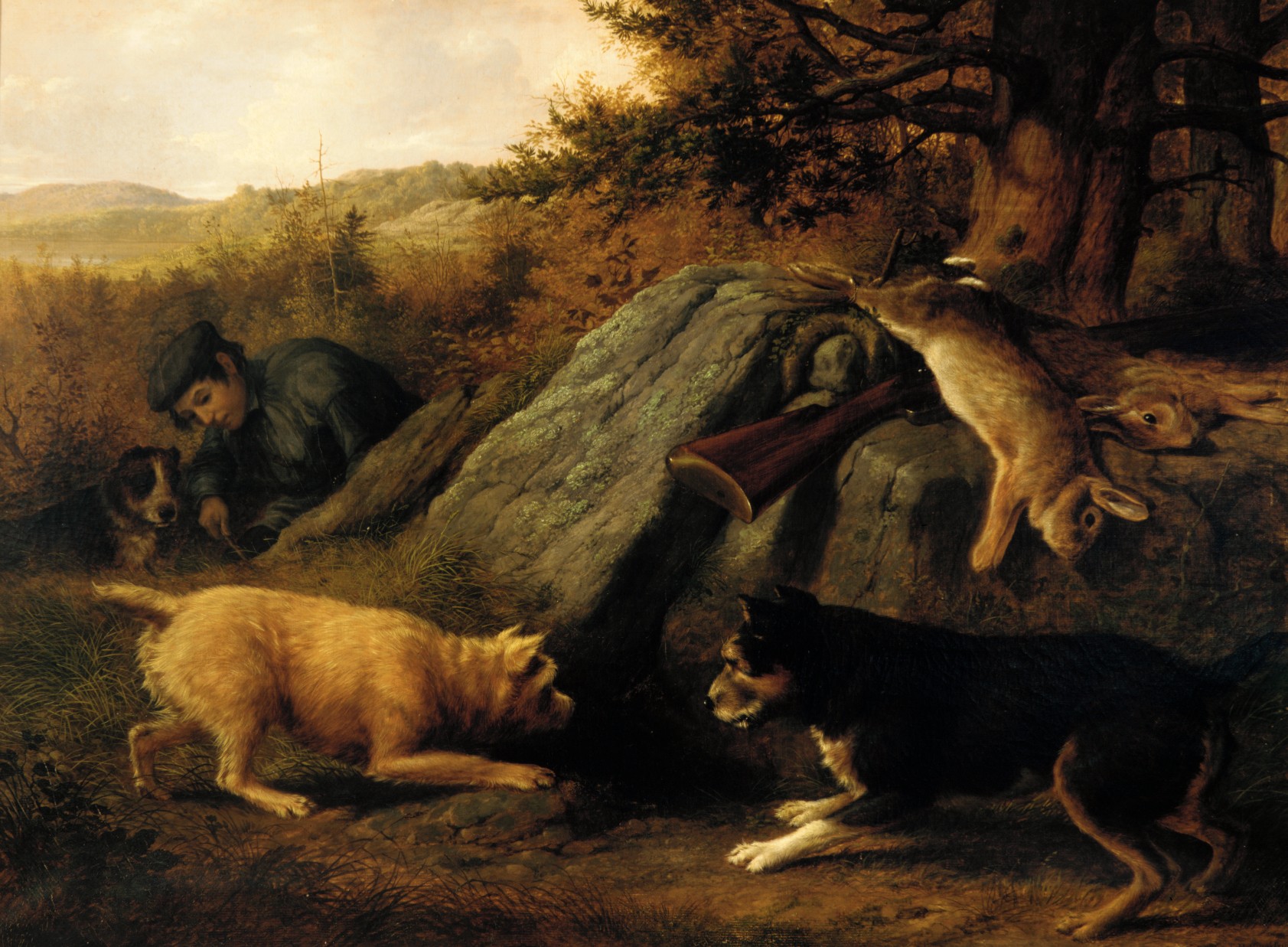Despite what some may believe, hunting is not an exciting activity. Of course, it has its exciting moments, though they are few and far between. There is the adrenaline-spiking sighting of one’s prey, the heart-pounding moment of aiming, the near total loss of oneself in the intensity of concentration, the shot, the slow descent into a mixture of satisfaction (if one has succeeded) and the vague nausea that, for myself at least, always accompanies the act of killing. Yet such moments come, if they come at all, only after immense trials of patience and more than likely several failures. This is especially true for the bow hunter, for whom the proximity necessary for a successful shot demands incredible stealth or grueling days in a hunting blind. For the most part, hunting involves long hours quietly walking or sitting in nature, with the occasional chance of using your weapon. It is frequently quite boring.
And yet this boredom may be its greatest virtue.
The last hunting trip I went on (some years ago now), I spent a full morning in a blind watching cows stand around a small pond. If one hasn’t been forced to observe the bovine species for extended periods of time, there is really no way to communicate just how sedentary they are. Except for the initial rush of trotting hooves eager to arrive at their watering place, and the occasional mischief—I saw an older cow push a youngster into the pond—they simply stood about ruminating, taking an occasional sip, flicking their tails. They seemed to blend into their environment, like stones or shrubbery.
Such experiences are typical of most of the hunting trips I’ve been on. I have spent long days sitting in a cramped and hot blind staring out at a heap of rotting apples, a pond, or a pile of hay waiting for elk or deer. On a few occasions I brought books with me, Dante or The Peregrine, as I recall, and yet these works provided only momentary distraction, and it is hard to become absorbed in a book in such uncomfortable circumstances, especially when one has to look up every few minutes to examine the landscape. Within a few hours, I abandoned my books and simply sat, restlessly, watching the slow shifting of the light as the predawn shadows slowly moved and shrunk under the glowing blue and gold cutting through the pine forests.
Giving in to this kind of slow, silent attention can be painful at first, sometimes excruciatingly so. Every inch of my body begins to itch, my thoughts go wild, and I twitch and shift and mutter to myself. But, given enough time, all such symptoms of unquiet disappear, and one’s inner movements begin to conform themselves to the glacial transformations of the woods; the mind opens, and a vigilance descends, a vigilance that bears with it peace. But to arrive there, one must accept the fire of that initial turbulence.
Now, I don’t normally think of myself as a highly distracted person, at least compared to so many of my ever-flitting generation. I read long, frequently dry texts for a living, after all, and am usually able to sustain my attention for decent lengths of time. But my experiences in the hunting blind force me to recognize that my mind is usually a buzzing storm. Even the most focused moments of an average day are a flurry compared to the placid mirror of those silvan hours when the storm has at last subsided.
Hunting requires a kind of prolonged exposure to the silence and slow rhythms of nature that one might otherwise miss in less demanding circumstances, but hunting is not the only means of meeting nature in this way. On a weeklong backpacking trip I took with a group of my peers in high school, we all felt that peace to some extent as we hiked and slept by the opal waters of the Illinois or threaded the long burn scars of the Kalmiopsis. It became intense enough that we feared its loss as much as we longed for the comforts of home. Sitting on the bus returning to town, we discussed the feeling of dismay many of us felt at exiting that wilderness, a feeling I can only think of as culture shock. And we were returning to a small town in a rural county; imagine if we had, as one guide laughingly threatened, gone to a Wal-Mart supercenter. We grew accustomed again, of course, even as many of the friendships and resolutions we had taken over the sanity of that week melted away. But that experience drove me out more and more to seek in nature what I would later find in the boredom of hunting blinds.
Despite feeling this peace on several occasions, only once, after multiple days of silently waiting for elk, did it come with me back to civilization in a prolonged and tangible way. The world felt intensely present to me and I to it; it was a freedom comparable to little else. My time was truly my own, my mind capable of lighting upon whatever it wished for as long as it wished, and I did all I could to maintain my focus. Despite my best efforts, however, the feeling evaporated after less than a week, and I have not felt anything as powerful since. I can only conclude that there is something about modern life that is fundamentally inimical to such interior silence, and that only the most disciplined, or the most monastic, can really maintain it in the midst of our society. I don’t doubt that there are such people—athletes of prayer and meditation—who live much like the rest of us yet move not in the scramble of contemporary society, but with the motions of nature, the slow unfolding of petals, the growing grass, the migrating clouds.
Certainly one modern barrier to such stillness is our fear of boredom. I suspect this has always been a problem for those not forced to constant activity, and indeed those who are so engaged may feel their occasional moments of leisure as an even more difficult circumstance. But our age is one in which boredom can be remedied more quickly and more assuredly than has ever been possible, and of course the nature of so much media tends not only to engage our attention but to harry it from place to place, never granting rest or replenishment or demanding anything of our patience. And so we move about in a constant churning. Even if we are sedulous in our media hygiene, the noise alone of all but the most rural settings tend to stir up our psyches, and there are always ways to avoid stillness for those who are reluctant to pass through the boredom it can engender. This reluctance keeps us flitting even if everything about us dwells in perfect quiescence; we bring the chaos with us. Such avoidance is understandable, for boredom is painful or even excruciating if raised to high enough pitch. Yet if we can embrace boredom, even just occasionally, in seeking moments of silence, of prolonged attention, that pain can purify us as an ascetic labor, and the discomfort slowly diminishes, leaving calm and contentment in the present. Nature is an aid in this, a kind of midwife, but we might find it in ourselves just as well as in the wilderness. For the deeper currents of life, those that birth the forms of trees and rivers, are in us, too, flowing beneath everything and gathering in pools. It is only atop them that we build our empires of distraction. To find these deeper wells of silence, however, we must seek them out, whether in the woods or the deserts of our own shut doors.
Once, several years ago, I was walking in the forests near my home town and came across a series of boulders large enough to have hollows beneath them, where someone had made a rudimentary camp. Carved into a tree next to this camp were the words “in the woods we return to reason and faith.” I believe this is true, but only if we allow the peace of nature to seep into us, only if we search out the stillness already deep within us that might answer to it, only if we find, like the cows, that part of ourselves which is at one with the earth and growing things, where we are still waters. Becoming still enough, going deeply enough into the ache of our patience, we might know those deeper streams and feel, way down, the source that brought them forth.
Image Credit: Thomas Hewes Hinckley “The Rabbit Hunters” (1850) via Wikimedia Commons





2 comments
Jon Cook
Amen.
Jon
Amen.
Comments are closed.